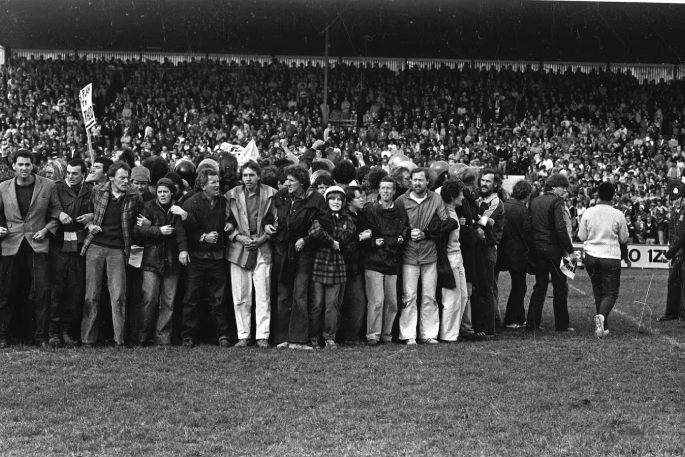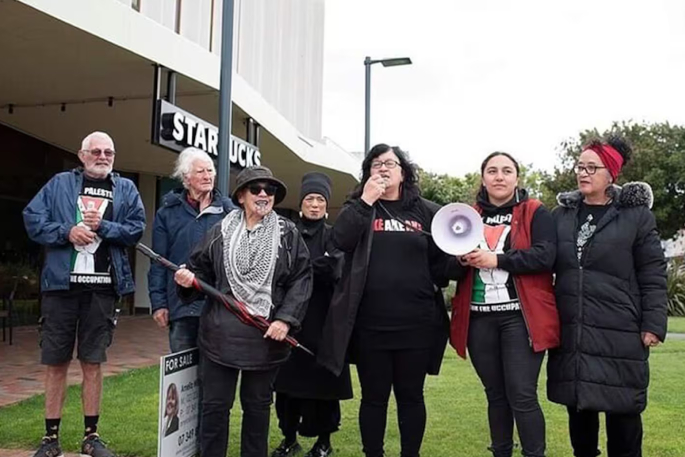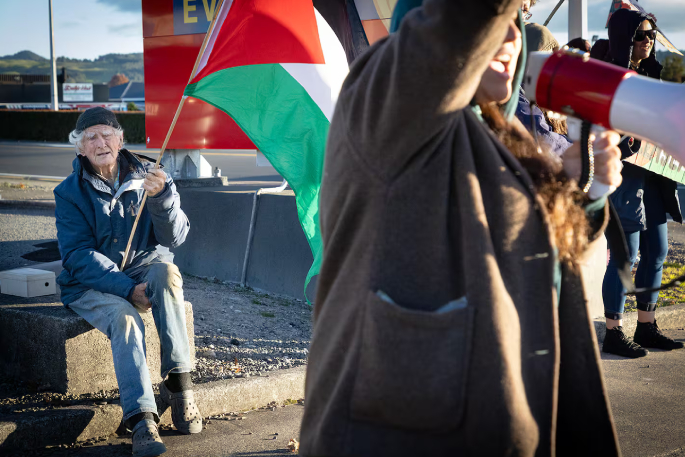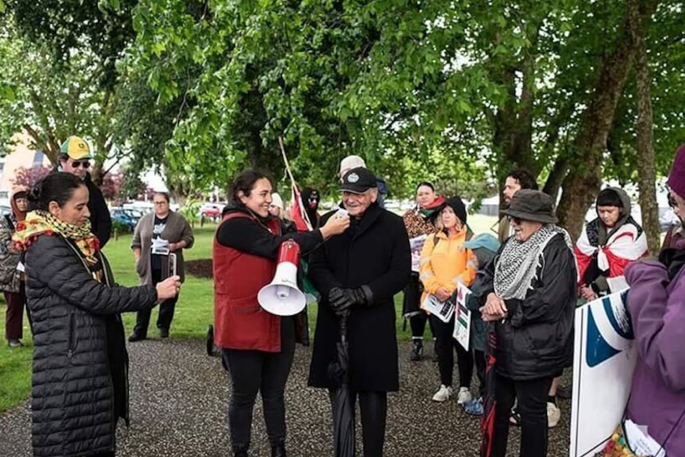It’s a brisk Thursday afternoon and Bernie Hornfeck is sitting on a concrete block waving a Palestinian flag outside Rotorua MP Todd McClay’s office.
The 95-year-old is surrounded by fellow protestors and activists, many young enough to be his great-grandchildren. Carrying flags and placards, they are chanting for a ceasefire in Gaza.
Bernie, a veteran of some of New Zealand’s most famous protest movements, joined Mataara Mai, a Rotorua-based protest group focused on indigenous rights, in November.
The group gathers on the corner of Amohau and Ranolf Sts at 4pm every Thursday, to protest outside the Associate Minister of Foreign Affairs’ office.
Wearing his characteristic beanie, Bernie tells the Rotorua Daily Post what is happening to Palestinians is “hurtful”.
Bernie has been standing up for indigenous rights for the past 70 years. He recalls joining the 1975 Māori land march and other land protests at Bastion Point, Raglan and Whanganui; protesting against the 1981 Springbok tour and walking in the hīkoi to protest the Foreshore and Seabed legislation in 2004.
The retired forestry worker moved to Aotearoa from England in 1950, aged 20.
He says his first act of protest was learning te reo. He remembers being sent to Ruatahuna for his first forestry job.
“Everybody spoke Māori, even the Pākehā schoolteacher spoke Māori, so I bought a book.”
After learning the language, he would be invited to speak at events.
“They wanted to embarrass other Europeans, like ‘if he can do it, why can’t you do it?’”
Bernie says he was arrested and jailed with his son during the Springbok vs Waikato protest in Hamilton on July 25, 1981.
 Protesters stand mid-field at Rugby Park, Hamilton in July 1981. Photo / John Sefton.
Protesters stand mid-field at Rugby Park, Hamilton in July 1981. Photo / John Sefton.
They joined hundreds of other protestors invading the pitch at a packed Hamilton Rugby Park (now FMG Stadium) shortly before the match was due to kick off. The protest put South Africa’s apartheid regime in the centre of global attention.
“Several hundred of us went through the crowd and formed a group in the middle of the ground,” Bernie recalls.
“I believe that the game being called off was the end of apartheid. It was the final blow to apartheid in South Africa and to racism back here – in terms of [the idea that] a man can’t be in the All Blacks if he’s got a brown skin”.
Bernie says he believes that act of passive resistance in Hamilton was what led to Nelson Mandela getting out of prison and that officials “knew the end had come”.
“South Africans got up at half past five to watch the game and all they saw were police arresting us,” he says.
“They let us out [of jail] at two o’clock in the morning, we came back here to Rotorua and the people at the marae were all up and waiting for us.
“They weren’t going to bed until we were home.”
Bernie’s wife Whare, is a member of the Māori Women’s Welfare League. Bernie says his protest action is driven by love of his community and effecting change.
He says he’s never wanted to give up protesting.
 Bernie Hornfeck, Annette Sykes, Ngahuia Te Awekotuku, Hinemaia Ngatai-Smith and Donna Awatere Huata were among the group at Mataara Mai's first march in Rotorua, November 2023. Photo supplied.
Bernie Hornfeck, Annette Sykes, Ngahuia Te Awekotuku, Hinemaia Ngatai-Smith and Donna Awatere Huata were among the group at Mataara Mai's first march in Rotorua, November 2023. Photo supplied.
Todd tells The Rotorua Daily Post he has spoken to Bernie about different issues over the years.
“I’ve got a huge amount of admiration for Bernie. I’ve always found him respectful and whilst we might not agree all of the time, I absolutely support his passion to raise issues that are important to him on behalf of many people.
“It’s a very concerning challenge in the Middle East and it’s something that I know many New Zealanders feel quite strongly about. The loss of life is tragic and quite horrendous.
“As recently as last weekend, we supported a resolution in the UN, for Palestine to have greater engagement and involvement with the UN itself,” Todd says.
‘Advocate for tangata whenua rights’
Mataara Mai was formed to “advocate for tangata whenua rights,” founder Hinemaia Ngatai-Smith says.
The group counted about 200 people at their first protest march over the Gaza conflict in November.
It began at the war memorial, proceeded through the CBD and ended with a haka and speeches from leaders such as Annette Sykes, Donna Awatere and Sir Bom Gillies - the 99-year-old last surviving member of the 28th Māori Battalion.
 Long-time protester Bernie Hornfeck. Photo / Andrew Warner.
Long-time protester Bernie Hornfeck. Photo / Andrew Warner.
“[Bom] started us off with a karakia and he actually spoke about his past being in the war, he says that war is not the way forward, war will never find peace,” Ngatai Smith says.
Recognising their first march had “almost all the old guard who stopped the Springbok Tour”, Hinemaia says being based in Rotorua could feel secluded when it came to caring about global issues.
Another founder, Cassey Thompson, says coming out every Thursday afternoon was a therapeutic way to stand with others who cared about the same issues locally. As a mum, she says she used protest as an outlet to vent her frustration “in a healthy way”.
 Koro Bom Gillies speaks at the Mataara Mai first march in November 2023. Photo supplied.
Koro Bom Gillies speaks at the Mataara Mai first march in November 2023. Photo supplied.
“All of our events start with tikanga Māori so starting with a karakia, ending with a karakia and we make sure we go home and have our kai and do what we do as Māori at any kaupapa,” Cassey says.
Cassey says Mataara Mai was about indigenous standing up for indigenous, “everywhere, all over the world, not just Palestine”.
Hinemaia says having Bernie, Bom, Donna and Annette at their first rally “made us as young people feel we’ve got that same power”.
“We’ve seen them fight against what was happening in Palestine when they were teenagers and to see them now, Bom being 90 something, but still going, it’s crazy to think they still have to fight.”

-and-Cassey-Thompson.jpg)

0 comments
Leave a Comment
You must be logged in to make a comment.